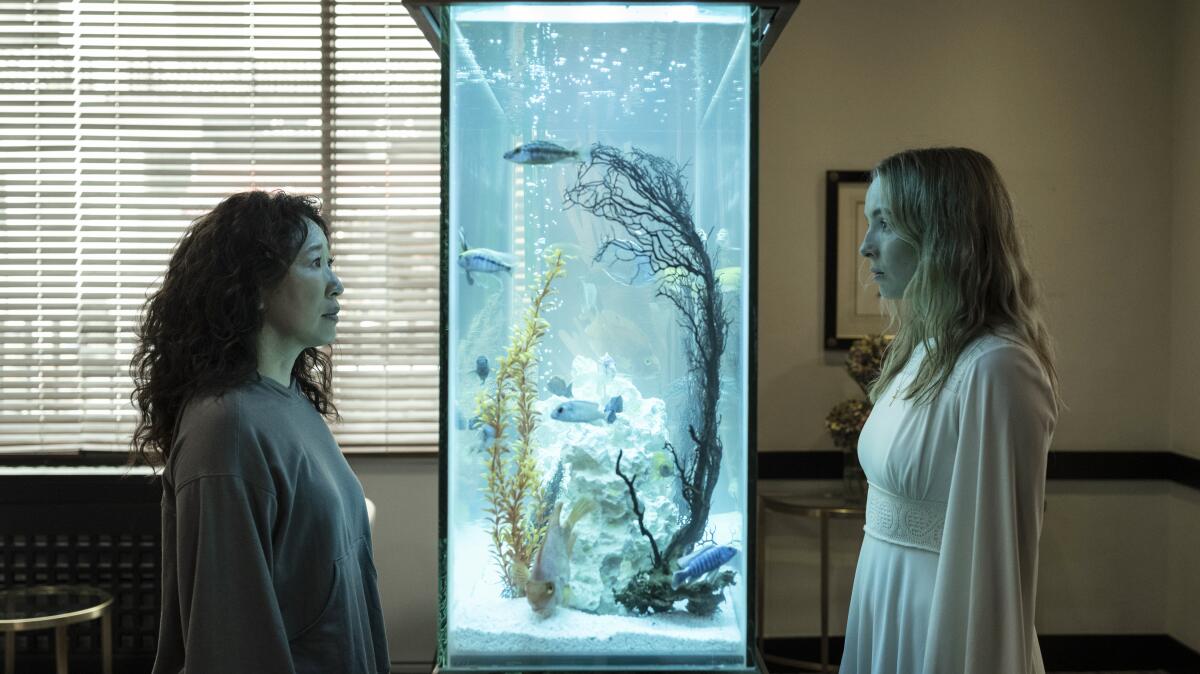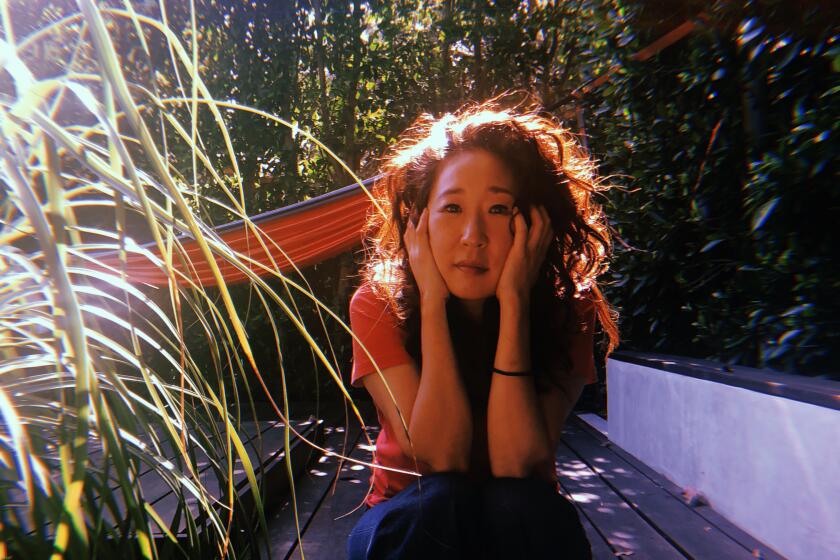Amid an ever-growing body count, two women find themselves in ‘Killing Eve’

- Share via
Days before the cult hit “Killing Eve” wrapped its four-season run on BBC America, star Jodie Comer was coping with the loss of playing Villanelle, the assassin with a wicked sense of fashion and humor she’d played for over five years. How was she planning to deal?
“Crying like a baby,” says the Liverpool-born Comer. “I’m highly emotional.”
That’s not the sort of answer her alter ego would have given. Possibly sociopathic and certainly capable of slitting Achilles tendons while lurking under a bed — smiling all the while — Comer’s Villanelle was a sui generis TV antiheroine not given to sentimentality. And when paired with Sandra Oh’s titular MI6 agent-turned-renegade, “Killing Eve” became a show unlike any other on television — funny, dark, bloody, full of mind-blowing fashion … and created, written by and starring women.
Over the course of five years (the series did not air in 2021 due to the pandemic) and 32 episodes, “Eve” followed the intersecting tracks of female spies, agents and assassins who bounced off one another in uniquely female ways. Yes, there were gadgets and secret organizations, prisons, deaths and dark humor, but ultimately “Eve” was never about saving the world from yet another megalomaniac, a la James Bond. It was about women saving themselves … albeit with a body count.
Sandra Oh shares why she spoke out against anti-Asian hate, why her focus is now on roles that embrace identity and why it’s an honor just to be Asian
“The most important thing for me about this show is these two women [Villanelle and Eve] and their relationship with each other, and how in each other they found their missing piece, and through that relationship became more whole,” says showrunner Laura Neal, who joined the show in 2019 and became the lead writer for the final season.
“We’ve never seen a two-hander like this with women,” acknowledges Dan McDermott, president of Entertainment & AMC Studios (AMC Networks includes BBC America). “It demonstrated very clearly that we can have big, successful series that are both commercially and creatively successful — and also successful in awards — from women.”
Yet “Killing Eve,” based on the Villanelle book series by Luke Jennings, initially struggled to find a home. Developed by Sally Woodward Gentle’s Sid Gentle productions, the series should have been an easy sell, especially with a first-season showrunner named Phoebe Waller-Bridge (“Fleabag”). (Each season has featured a different showrunner, including Suzanne Heathcote and “The Crown’s” Emerald Fennell.) Yet it didn’t land for U.K.-based TV programmers.
“In the U.K., scripted tends to be split into comedy and drama, and it’s run by different people,” explains executive producer Gentle. “It was confusing to people.”
But BBC America was actively seeking female-led stories, and as former SVP of its scripted programming Gina Mingacci notes, “Fleabag” had executives “obsessed.” “It wasn’t even a question,” she says. “Creatively, this was our show.”
The spin wasn’t just that women were doing the killing in “Eve.” Villanelle and Eve (plus Fiona Shaw’s boss Carolyn) were tough — but also wracked with identity crises; they were simultaneously repelled and attracted to one another. No surprise, then, that AMC Networks was interested — “Eve” sits on the spectrum with “Breaking Bad” and “Better Call Saul” in its overall themes: Eve reinvented herself as a killer, while Villanelle reconsidered whether she wanted to keep killing.
“Eve’s journey was a little more cyclical than ‘Breaking Bad,’” suggests Neal. “She was discovering elements of herself that she has struggled to liberate. The journey of the show is unleashing those elements, taking them to an extreme and re-centering herself. [“Bad’s”] Walter White didn’t have so much of that re-centering.”
Then, premiering as it did at the height of the #MeToo era, “Eve” hit another part of the zeitgeist. Villanelle’s behavior contained “a degree of wish fulfillment,” notes Gentle. “We talked a lot about what it would be like to live your life without fear.”
Taking a break after her nearly 10-year, Emmy-nominated run on “Grey’s Anatomy,” Sandra Oh was in no particular hurry to take on a new project just for the sake of having a gig.
Agrees Neal, “Watching female characters act without shame and fear and worrying about judgment is fresh and unique. It’s not ideal in the real world, but it feels aspirational to a female audience.”
Comer absorbed that message personally. “Through [Villanelle] I had to really shake off my awareness of what people think,” she says. “I had to really be fearless in my decision-making. She literally apologizes for nothing. I probably say ‘sorry’ 30 times a day. But I think she’s made me freer as a person.”
In the end, though, four seasons was the limit for Villanelle and Eve’s journey. AMC’s McDermott says they were “open” to a “longer story,” which might be good news for the rumors of a spinoff, perhaps focused more on Shaw’s Carolyn.
But Gentle insists if it’s to happen, “it’s a long way off.”
For now, “Eve” has come to a conclusion that she insists stays true to their key women. “We wanted to think about what would be truthful to those characters,” she says. “We gave them the freedom to finish it, and not cop out. We didn’t want to chicken out of anything.”
And that’s something Villanelle would definitely have appreciated.
More to Read
From the Oscars to the Emmys.
Get the Envelope newsletter for exclusive awards season coverage, behind-the-scenes stories from the Envelope podcast and columnist Glenn Whipp’s must-read analysis.
You may occasionally receive promotional content from the Los Angeles Times.











